形容词、副词讲解
形容词和副词用法总结归纳讲解

C.especiallyD.luckily
12._____, the thief didn’t take anything valuable but my notebook.
A. Strange it isB. To be strange
C. Strangely enoughD. It was strange
C. surprisinglyD. hardly
4.—What do you think of the plan?
—I feel_____that we ought to give it up at once.
A. strongB. stronger
C. stronglyD. it strong
5.【1993全国】She doesn’t speak_____her friend, but her written work is excellent.
Watch hite意思是“晚”;lately意思是“最近”。如:
What have you been doing lately?
3.deep与deeply
deep意思是“深”,表示空间深度;deeply时常表示感情上的深度,“深深地”。如:
He pushed the stick deep into the mud.
8._____, he didn’t fail in the exam.(luck)
9.He was _____ ill and I was _____ sorry for that. (terrible)
10.It was _____ (extreme) cold that day and the meeting was _____ (especial) important.
高考英语复习形容词和副词知识点讲解讲义(必考点)
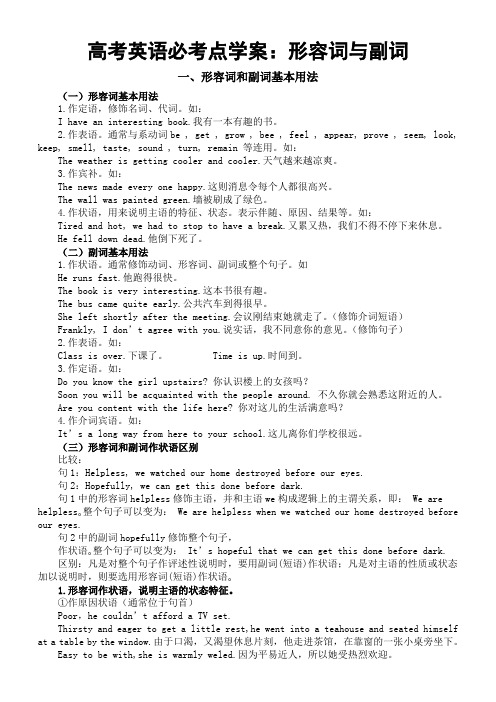
高考英语必考点学案:形容词与副词一、形容词和副词基本用法(一)形容词基本用法1.作定语,修饰名词、代词。
如:I have an interesting book.我有一本有趣的书。
2.作表语。
通常与系动词be , get , grow , bee , feel , appear, prove , seem, look, keep, smell, taste, sound , turn, remain 等连用。
如:The weather is getting cooler and cooler.天气越来越凉爽。
3.作宾补。
如:The news made every one happy.这则消息令每个人都很高兴。
The wall was painted green.墙被刷成了绿色。
4.作状语,用来说明主语的特征、状态。
表示伴随、原因、结果等。
如:Tired and hot, we had to stop to have a break.又累又热,我们不得不停下来休息。
He fell down dead.他倒下死了。
(二)副词基本用法1.作状语。
通常修饰动词、形容词、副词或整个句子。
如He runs fast.他跑得很快。
The book is very interesting.这本书很有趣。
The bus came quite early.公共汽车到得很早。
She left shortly after the meeting.会议刚结束她就走了。
(修饰介词短语)Frankly, I don’t agree with you.说实话,我不同意你的意见。
(修饰句子)2.作表语。
如:Class is over.下课了。
Time is up.时间到。
3.作定语。
如:Do you know the girl upstairs? 你认识楼上的女孩吗?Soon you will be acquainted with the people around. 不久你就会熟悉这附近的人。
语法专题讲解形容词和副词的用法
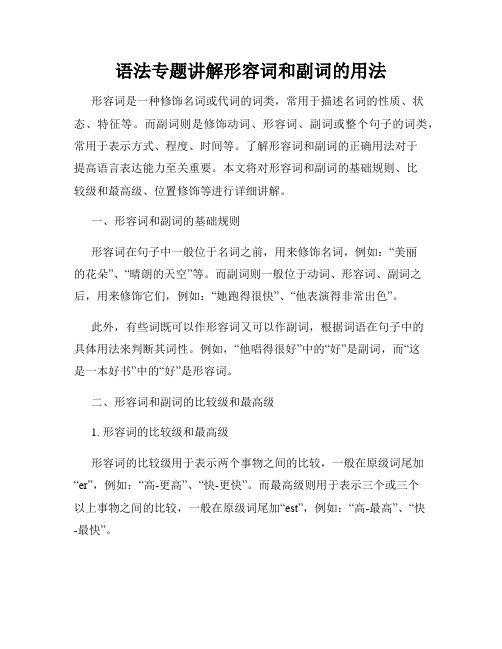
语法专题讲解形容词和副词的用法形容词是一种修饰名词或代词的词类,常用于描述名词的性质、状态、特征等。
而副词则是修饰动词、形容词、副词或整个句子的词类,常用于表示方式、程度、时间等。
了解形容词和副词的正确用法对于提高语言表达能力至关重要。
本文将对形容词和副词的基础规则、比较级和最高级、位置修饰等进行详细讲解。
一、形容词和副词的基础规则形容词在句子中一般位于名词之前,用来修饰名词,例如:“美丽的花朵”、“晴朗的天空”等。
而副词则一般位于动词、形容词、副词之后,用来修饰它们,例如:“她跑得很快”、“他表演得非常出色”。
此外,有些词既可以作形容词又可以作副词,根据词语在句子中的具体用法来判断其词性。
例如,“他唱得很好”中的“好”是副词,而“这是一本好书”中的“好”是形容词。
二、形容词和副词的比较级和最高级1. 形容词的比较级和最高级形容词的比较级用于表示两个事物之间的比较,一般在原级词尾加“er”,例如:“高-更高”、“快-更快”。
而最高级则用于表示三个或三个以上事物之间的比较,一般在原级词尾加“est”,例如:“高-最高”、“快-最快”。
如果原级词以“e”结尾,则只需在词尾加上“r”或“st”,例如:“large- larger- largest”。
而对于以一个辅音字母结尾的重读闭音节词,则要双写辅音字母,并加上“er”或“est”,例如:“big- bigger- biggest”。
2. 副词的比较级和最高级副词的比较级和最高级的构成与形容词的变化规则相似,一般在原级词尾加“er”或“est”,例如:“quickly- quicker- quickest”。
然而,有一些词的比较级和最高级是不规则的,例如:“well- better- best”、“badly- worse- worst”。
需要特别注意的是,有些词没有比较级或最高级,只能用原级形式表达。
例如,“unique”、“perfect”等词。
初一英语形容词和副词语法知识总结(讲解+考点+综合练习):形容词和副词
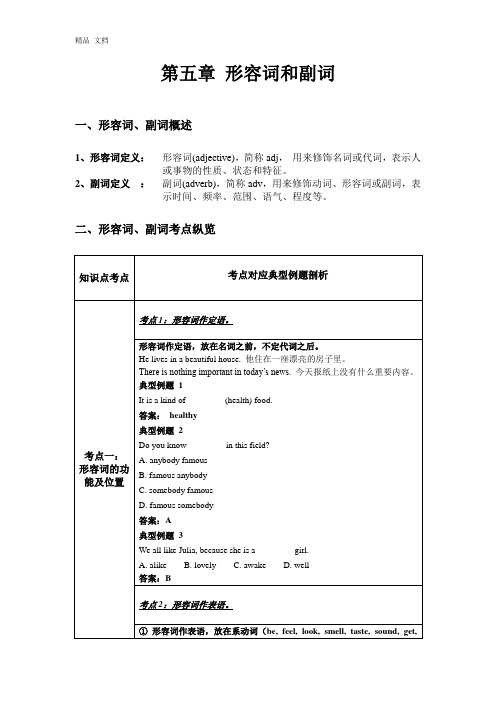
第五章形容词和副词一、形容词、副词概述1、形容词定义:形容词(adjective),简称adj,用来修饰名词或代词,表示人或事物的性质、状态和特征。
2、副词定义:副词(adverb),简称adv,用来修饰动词、形容词或副词,表示时间、频率、范围、语气、程度等。
二、形容词、副词考点纵览三、综合练习( )1. –If you don’t like the red coat, how about the green one?–OK, but do you have _______ size in green? This one is a bit small for me.A. a bigB. a biggerC. the bigD. the bigger( )2. –Mum, I think I’m _______ to get back to school.–Not really, my dear. You’d better stay at home for anoth er day or two.A. so wellB. so goodC. well enoughD. good enough ( )3. –What delicious cakes! –They will taste _______ with butter.A. goodB. betterC. badD. worse( )4. –Mr. Zhou , of all the students in our group, who lives _______ ?–I think Li Lei does.A. farB. fartherC. farthestD. the farther( )5. With a history of more than 1,400 years, ZhaoZhou Bridge is the _______ stone arch bridge in the world .A. oldB. olderC. oldestD. elder( )6. Bob never does him homework _______ Mary. He makes lots of mistakes.A. so careful asB. as carefully asC. carefully asD. as careful as ( )7. A: How can I speak English _______ you?B: You’d better speak more, I think.A. as good asB. more thanC. as well asD. as much as( )8. Your English is good. I’ll try my best to speak it as _______you do.A. clearly asB. clear asC. clearer thanD. more clearly ( )9. –Is your mother badly ill?–No, _______ , only a little cold.A. serious anythingB. serious nothingC. nothing seriousD. anything serious( )10. I’m not sure if I’m going to Tim’s party; I may go to the concert _______ .A. onlyB. insteadC. earlyD. late( )11. Although they are brothers, they are the _______ opposite of one another.A. veryB. justC. fewD. little( )12. The new Bright Restaurant is _______ than the old one. Moore and more people like to eat there.A. goodB. betterC. badD. worse( )13. Wang Ping does _______ in physics that I missed the first class.A. badlyB. Most badlyC. worseD. worst( )14. I got up so _______ this morning that I missed the first class.A. earlyB. lateC. quietlyD. neatly( )15. –Do you enjoy traveling by plane?–No. It’s _______ expensive.A. much moreB. more muchC. too muchD. much too( )16. I’m afraid the headmaster is _______ busy to meet the visitors.A. too muchB. much tooC. so muchD. much too( )17. How beautifully she sings! I’ve never heard _______ .A. the better voiceB. a good voiceC. the best voiceD. a better voice( )18. You do well in your lessons. I’m _______ you will pass the exam.A. sureB. afraidC. sadD. sorry( )19. –Who is _______ in your class?–Fred.A. tallB. tallerC. tallestD. the tallest( )20. –What do you think of the football match?–Wonderful! The Chinese football team has never played _______ .A. betterB. bestC. worseD. worst( )21. The population of China is _____ than _____ of any other country in the world.A. larger , the oneB. more , thatC. larger , thatD. more , the one ( )22. There is much wine here, but _______ people want to drink it.A. manyB. a littleC. fewD. a few( )23. People speak ______ of the film Not One Less. It is really necessary for every child to go to school.A. loudB. loudlyC. highD. highly( )24. She always finishes her homework on time. She ______ leaves it for tomorrow.A. alwaysB. neverC. usuallyD. sometimes( )25. The football match was _______, so the boys were _______ about it.A. excited , excitingB. exciting, excitedC. excited , excitedD. exciting , exciting( )26. Playing table tennis isn’t difficult. You can learn it _______.A. easyB. easilyC. quickD. hardly( )27. We Chinese always put our family name _______.A. lastB. nearlyC. firstD. in the middle ( )28. This kind of T-shirt look _______ and sells _______ in the market.A. nice, goodB. well , wellC. nice , wellD. good , nice( )29. The light in the room wasn’t _______ for me to read.A. brightly enoughB. enough brightlyC. enough brightD. bright enough( )30. –Look, this digital camera is really cheap! It’s only five hundred yuan.–The _______ , the better. I’m short _______ money, you know.A. cheaper , ofB. cheap, forC. expensive , ofD. more expensive , for( )31. Which subject do you like _______ , math, Chinese or English?A. betterB. bestC. wellD. very much( )32. _______ little water is not enough for _______ many people.A. Such , soB. So , soC. Such , suchD. So , such( )33. English is spoken by _______ people.A. a lotB. much manyC. a large number ofD. a great deal of ( )34. –Isn’t that Mary?–Yes, she always has a(an) _______ smile on her face.A. aloneB. kindlyC. ownD. friendly( )35. –Do you prefer music to drawing?–No. I like drawing _______.A. wellB. mostC. betterD. best( )36. Since China has been a member of the WTO, English is ______ useful than before.A. moreB. mostC. muchD. very( )37. Can you speak a little louder? I can _______ hear you.A. hardB. reallyC. hardlyD. clearly( )38. China has a _______ population and long history.A. manyB. largeC. muchD. big( )39. Do you have _______ to say?A. important anythingB. anything importantC. important somethingD. something important( )40. Which is _______ , English or Chinese?A. interestingB. interestingerC. more interestingD. most interesting( )41. –The TV programme is boring. Shall we play chess intead?–All right. That is _______ than watching a boring programme.A. very goodB. much goodC. very betterD. much better( )42. –Mum, could you buy me a dress like this?–Certainly, we can buy _______ one than this, but _______ this.A. a better, better thanB. a worse , as good asC. a cheaper , as good asD. a more important , not as good as ( )43. Let’s enjoy the song Yesterday Once More. It sounds _______.A. wellB. sadlyC. niceD. bad( )44. –Is the physics problem _______ ?–Yes. I can work it out _______.A. easy , easilyB. easy, easyC. easily , easyD. easily , easily ( )45. Hainan is a very large island. It’s the second _______ island in China.A. largeB. largerC. largerD. most large( )46. What a _______ cough! You seem _______ ill.A. terrible, terriblyB. terribly , terribleC. terrible , terribleD. terribly , terribly ( )47. I’m not sure whether Mary can sing _______ Mabel.A. as well asB. as good asC. so good asD. as better as( )48. Chinese is _______ more difficult than English.A. mostB. veryC. manyD. much( )49. The _______ old man told his son to be a good boy.A. diedB. deadC. dyingD. death( )50. Today my sister is feeling _______ to go to the factory.A. enough goodB. good enoughC. well enoughD. enough well参考答案精品文档1—5 B C B C C6—10 B C A C B11—15 A B D B D16—20 B D A D A21—25 C C D B B26—30 B C C D A31—35 B B C D C36—40 A C B B C文档说明(Word文档可以删除编辑)专注于精品文档:中考、高考、数学语文英语试卷、高中复习题目、小学试卷教案合同协议施工组织设计、期中、期末等测试,本文档目的是为了节省读者的工作时间,提高读者的工作效率,读者可以放心下载文档进行编辑使用.文档来源网络改编,审核有可能疏忽,如果有错误或侵权,请联系本店马上删除。
英语形容词_副词讲解

1. 某些形容词加上定冠词可以泛指一类人,与谓语动词 的复数连接。如:the dead,the living,the rich, the poor,the blind,the hungry (The poor are losing hope. ) 2. 有关国家和民族的形容词加上定冠词指这个民族的整 体,与动词的复数连用。例如:the British,the English,the French,the Chinese. (The English have wonderful sense of humor. ) 多个形容词修饰名 词的顺序 多个形容词修饰名词时,其顺序为: 限定词--数词--描绘词--(大小,长短,形状,新旧,颜色) --出处--材料性质,类别--名词 例如: a small round table a tall gray building a dirty old brown shirt a famous German medical school an expensive Japanese sports car
9. 表示主语长期的静止状态,不强调动作的sit,stand,lie 接形容词quiet, silent, still, red, peaceful等 The valley lay quiet and peaceful She sat silent. They stood still. 10. become,fall ,get,go,turn表示变得时后跟形容词. The leaves fell/got/went/turned yellow. It fell/got/went/turned cold. 11. present表示出席的,到场的的时候常放在名词后,the members present表示现在的则放在名词前the present members 12. live有时可用做形容词: a live fish 活鱼(形容动物, 不形容人 ) The broadcast comes to you live from Canada 实况转播 That wire is live 电线是带电的 lively 生动的,活泼的。His class is often lively. 13. the +adj表示一类人,是复数The rich should help the poor. the blind/wounded/young/old
形容词与副词讲解加练习
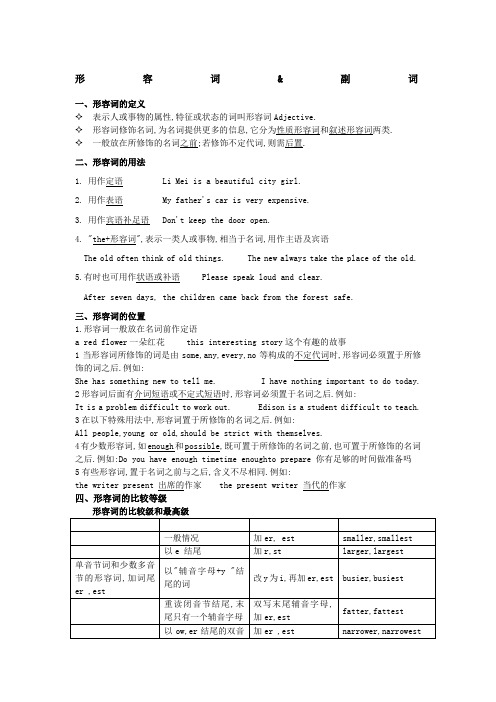
形容词&副词一、形容词的定义✧表示人或事物的属性,特征或状态的词叫形容词Adjective.✧形容词修饰名词,为名词提供更多的信息,它分为性质形容词和叙述形容词两类.✧一般放在所修饰的名词之前;若修饰不定代词,则需后置.二、形容词的用法1. 用作定语 Li Mei is a beautiful city girl.2. 用作表语 My father's car is very expensive.3. 用作宾语补足语 Don't keep the door open.4. "the+形容词",表示一类人或事物,相当于名词,用作主语及宾语The old often think of old things. The new always take the place of the old.5.有时也可用作状语或补语 Please speak loud and clear.After seven days, the children came back from the forest safe.三、形容词的位置1.形容词一般放在名词前作定语a red flower一朵红花 this interesting story这个有趣的故事1当形容词所修饰的词是由some,any,every,no等构成的不定代词时,形容词必须置于所修饰的词之后.例如:She has something new to tell me. I have nothing important to do today. 2形容词后面有介词短语或不定式短语时,形容词必须置于名词之后.例如:It is a problem difficult to work out. Edison is a student difficult to teach. 3在以下特殊用法中,形容词置于所修饰的名词之后.例如:All people,young or old,should be strict with themselves.4有少数形容词,如enough和possible,既可置于所修饰的名词之前,也可置于所修饰的名词之后.例如:Do you have enough timetime enoughto prepare 你有足够的时间做准备吗5有些形容词,置于名词之前与之后,含义不尽相同.例如:the writer present 出席的作家 the present writer 当代的作家四、形容词的比较等级副词的比较级和最高级1.大多数以ly结尾的副词前加more 和most 来构成比较级和最高级;2.少数单音节副词,加er,est 构成其比较级和最高级 ;3. 几个特殊的形容词和副词1 句型"as…as",表示两者相比较,程度相同.The old man walks as fast as a young man.2 句型"not asso…as",表示两者相比较,前者不如后者.I'm not as tall as Jack. 我没有杰克高.3 表示两者之间比较时,用"形容词比较级+than"或"less…than"两种句型.Your mother looks healthier than before.4 more and more… 越来越…….The park is getting more and more beautiful.5 the 比较级…the比较级… 越……就越…….The more books we read, the cleverer we will become.6 "the+比较级+of the two…"两个中较……的一个.I'd like to go to the farther of the two places.7 "比较级+than any other+单数名词"比其他任何……都…….Li Lei is taller than any other boy in his class.8 三者或三者以上相比较,用"the+最高级+名词+范围"结构.This is the cleanest place of the city.9 表示"最……之一",用"one of the+形容词最高级+复数名词".The Great Wall of China is one of the greatest buildings in the world.注意: 形容词最高级前面必须加定冠词the,但当形容词最高级前面有物主代词修饰时,则不加the.例如:正This is my best friend.误 This is my thethe my best friend.五、几种常见的形容词句型1.形容词+介词+名词或代词或动名词I'm not interested in playing computer games.My parents are pleased with my studies.2.It iswas+形容词+of/for+名词或代词+不定式It's foolish of me to make such a mistake.It was kind of the driver to send the old man home.3.形容词+不定式常用于这种句型的形容词有:able,sure,lucky,ready,happy,likely等. She is sure to pass the exam. I'm lucky to meet you here.副词的用法1. 副词修饰动词,在句子中作方式状语;例如:The man runs fast. fast修饰runs这个动作2. 副词修饰形容词,并且通常放在形容词的前面例如:He becomes very handsome.3. 在“副词+形容词”这样的结构中,中心词是形容词,副词只是为了说明程度大小即:very handsome的中心词是handsome4. 副词前面也可以加副词,例如上面的句子都可以改写成:The man runs very fast.very本身是副词,意思是“非常,很”,所以后面也可以跟副词或者形容词;❖填形容词还是副词实义动词后面跟副词,连系动词后面跟形容词;例如:She sings beautifully. sing是实义动词,beautiful用来说明唱得如何She looks sad. look是连系动词,后面跟形容词还有一些不是连系动词的词,例如make和get,要根据句子的意思判断填形容词还是副词;区分:He is making a kite carefully.carefully用来修饰make这个动词He made the teacher angry.angry是指the teacher,而不是修饰make这个动词于是有词组:make sb+adj. leave sb+adj. get+adj❖形容词和副词分别长什么样子1.形容词的词尾通常有ing/ful/ed/yinteresting、tiring、boring、exciting、surprising、amazing与物有关interested、tired、bored、excited、surprised、amazed与人有关careful、hopeful、wonderful、helpful、colorful、meaningful、beautiful rainy、windy、cloudy、dry、messy、easy、funny、busy、angry区分:The children were excited when they heard the exciting news.The man was tired劳累的 after doing so many tiring累人的 jobs.但是在interesting与interested中,形容人或物的都用interesting,而interested 常以词组be interested in的形式出现,表示“对…感兴趣”;The story is interesting./The teacher is interesting.2.副词的词尾通常是ly,但亦有一些不以ly结尾的副词;badly、surprisingly、carefully、hopefully、quickly、greatly、possibly通常是由形容词加ly变来hard努力地、well好、high高、fast快地、pretty十分,非常、very much/a lot 非常a little一点3.有些词既是形容词也是副词hard adj.硬的 adv.努力地 early adj.早的 adv.早地 late adj.迟的adv.迟high adj.&adv. 高 well adj.健康地 adv.好形容词比较级练习题一写出下列形容词与副词的比较级与最高级形式:long wide fatheavy slow fewbrightly badly farquickly happy unhappy 二用所给词的正确形式填空:1. Of the two girls, I find Lucy the clever.2. Gold黄金 is little useful than iron铁.3. My sister is two years old than I.4. John’s parents have four daughters, and she is the young child.5. The cheap bags are the not usually the best ones.6. The short one is by far expensive of the five.7. The boy is not so interesting as his brother.8. Dick sings well, she sings well than John, but Mary singswell in her class.9. She will be much happy in her mew house.10. This dress is than that one.expensive三翻译句子:1.这本书跟那本书一样有趣;This book is _____ _____ that one.2.你游泳没有你弟弟好;You can’t swim _____ _____ your brother.3.今天比昨天冷的多;It is today ______ it was yesterday. 4.这个故事比另一个有趣得多;This story is _____ ______ than that one. 5.他比我大两岁;He is _____ ______ than I.6.这个故事不如那个有趣;This story is _____ _____ than that one. 7.她的身体状况一天天好起来;She is getting ______ every day.8.他对英语越来越感兴趣;He is becoming ______ _____ _______ _____ English.9.他吃的越多,人越胖;The more he eats, the _______ he gets.10.你的问题是两个中比较难的那个;Your question is _______ ______ of two.副词练习一、将形容词变为副词1.easy2.hard3.true4.heavy5.careful6.happy7.fast 8.lucky 9.gentle10.possible 11.angry 12.sad13.good 14.bad 15.near16.terrible17.quick 18.nice二、用单词适当形式填空1. Look at the children on the playground. They are flying kites ________happy.2. Why do you think you did so ___________badin your test3. We can __________easy forgive a child who is afraid of the dark, but we can’t forgive an adult who is afraid of the light.4. Congratulations You’ve answered all the questions _________correct.5. The computer is wideused in our daily life. We can do many things with it.6. I changed into my sports shoes so that I could walk more ____________comfortable.7. Mary passed her examination because she studied very ________hard.8. “Why didn’t you tell me earlier ” The boss shouted _______hungry.9. It’s true possible that robot teachers will be popular in schools some day.10. How _________comfortable the giant pandas are living in Taiwan11. Miss Xu smiled and said to me ________soft, “Never mind, my boy”12. Last night it rained __________heavy in the southern part of the city.13. Simon hates to be like others, he often tires to do everything different.14. The children clapped their hands _________excited as soon as the astronauts appearedon the stage.15. Tom had an accident yesterday. His teacher sent him to the hospital quick.形容词与副词专项训练练习题1. Work gets done ________ when people do it together, and the rewards are higher too.A. easilyB. very easyC. more easilyD. easier2. My parents have always made me ________ about myself, even when I was twelve.A. feeling wellB. feeling goodC. feel wellD. feel good3. He began to take political science ________ only when he left school.A. strictlyB. trulyC. carefullyD. seriously4. The final score of the basketball match was 93-94. We were only ________ beaten.A. nearlyB. slightlyC. narrowlyD. lightly5. The new group of students is better-behaved than the other group who stayed here ________.A. earlyB. earlierC. earliestD. the earliest6. —Do you need any help, Lucy —Yes, The job is ________ I could do myself.A. less thanB. more thanC. no more thanD. not more than7. There is an old proverb, ―Love me, love my dog. But there is ________ wisdomin this: ―Love me, love my book.A. someB. muchC. moreD. most8. With April 18’s railway speedup, highway and air transport will have to compete with ________ service for passengers.A. goodB. betterC. bestD. the best9. The melon the Smiths served at dinner would have tasted ________ if it had been put in the fridge for a little while.A. goodB. betterC. bestD. well10. After two years’ research, we now have a ________ better understanding of the disease.A. veryB. farC. fairlyD. quite11. Speaking of all the songs he has written, I think this is probably his ________ one.A. better-knownB. well-knownC. best-knownD. most-known12. Of the two coats, I’d choose the ________ one to spare some money for a book.A. cheapestB. cheaperC. more expensiveD. most expensive13. —I wonder why Mary is so unfriendly to us.—She is ________ than unfriendly, I’m afraid.A. shyerB. much shyerC. shy moreD. more shy14. —I didn’t do well in this English examination. How about you—I did ________ you.A. not better thanB. no worse thanC. as well asD. no better than15. —Now that you like the house with a garden, why not buy it—Well, I can’t afford ________ house at present.A. that expensive aB. a such expensiveC. that an expensiveD. a so expensive用所给词的适当形式填空1.The river was so polluted that it _________actual caught fire and burned.2.Bend your knees slightly and reach out your arms like tree branches, naturally and _______ soft.3.Just be ______________ patience.4.Although parents should take _________ well care of their young children, they don’t ______________ necessary do anything for them.5.---Do you like Mary’s new hairstyle---Perfect How much ________ good she looks with the curly short hair6.--- Are you satisfied with the result of the exam--- Not at all. I can’t have a ________ bad one.7.--- Lily did succeed at last--- Yeah, indeed, but she was _______________ luck than successful, I think.8.That would be a very _________ reason thing to do in a big city, but it could destroy a small village like this.9.Mary felt __________ please, because there were many empty seats in the room.10. The teachers are very enthusiastic and __________ friend and the classrooms are _____________ amaze.单句改错只有一处错误1.The fruits are small in size, but juicy and taste.2.We don’t need to do so many homework. Therefore, we have more time for after-school activities.3.The teachers here are kind and helpfully. They are not only our teachers but also our friends.4. That is too much for us, considering how closely the houses are.5.I’m always caution about what I say because some careless remarks are likely to hurt other’s feelings.6.Doing physical exercise is an effect way to get rid of anger.7.But such a small thing couldn’t possible destroy a village.8.Interesting, it has a connection with the British porcelain 瓷器 industry.1. C;根据题意可知,说话者是将when people do it together和when people don’t do it together这两种情况比较,故选比较级;注意不要选D,因为在此题是要用副词修饰动词,不能用形容词;另外,根据句末的higher too也可知道此题是考查比较级;2. D;首先,根据连系动词后要接形容词作表语这一特点,可排除A和C;另外,使役动词make后可接动词原形不带to的不定式或过去分词作宾语补足语,但不能接现在分词,故可排除选项B;3. D;take sth seriously的意思是“认真对待某事”“认真考虑某事”;4. C;副词narrowly 在此表示“勉强地”,又如:He narrowly escaped being run over. 他差点儿被车压死; The proposal to change the rules was narrowly defeated by 201 votes to 196. 建议改变规则的提议以196票对201票的微弱差额被否决了;本题句意:篮球赛的最后比分是93比94;我们以微弱的劣势输掉了比赛;5. B;因题目把这组新学生与前面一组学生进行比较,故用比较级;6. B;注意句中的Yes,由于答话者对问话者的“你需要帮助吗”作了肯定回答,说明答话者独自完成工作有困难,故填more than;7. C;由于是将“Love me, love my dog”与“Love me, love my book”进行比较,故用比较级;此题的巧妙之处在于句中没有出现than,而是给出两个待比较的proverb; 8. B;句子大意为:由于铁路提速了,所以高速公路和航空业要提高服务质量来竞争客源;因将“高速公路和航空”与“铁路”比较,故用比较级; 9. B;题目中将“放入冰箱中冷冻”与“不放入冰箱中冷冻”作比较,故用比较级;句意为:史密斯家人晚餐时上的甜瓜若能放入冰箱中冷冻一下味道会更好些; 10. B;这四个副词中,通常只有far可用于修饰比较;注:quite有时也可用于修饰比较better,但它只用于表示“身体康复”,不用于其他意义; 11. C;因为是从他所写的所有歌中选出一首来比较,故用最高级from .hxen; 12. B;因是两者比较,故用比较级,可将答案锁定在B和C之间;再根据句意,排除C; 13. D;此题考查more…than…的用法,其意为“与其说……不如说……”; 14. D;句中的no better than相当于as badly as,其意为“一样不好”; 15.A;that在用作副词,用法相当于so,意为“如此,这么”;Ⅰ 1. actually 2. softly 3. patient 4. good, necessarily 5. better 6. worse 7. more lucky 8. reasonable 9. pleased 10. friendly, amazingⅡ1. taste---tasty 2. many----much 3. helpfully---helpful 4. closely --- close 5. caution---cautious6. effect---effective7. possible ---possibly8. Interesting---Interestingly9. more---manylonger longest wider widest fatter fattestheavier heaviest slow slower slowest fewer fewestmore brightly most brightly more badly most badlyfarther farthest more quickly most quickly happier happiest unhappier unhappiest二用所给词的正确形式填空:1. cleverer2.less3.older4.youngest5.cheapest6.more7.interesting8.well,better ,best 9. Happier 10. more expensive三翻译句子:1. as interesting as2. As well as3.much colder today than4. Much more interesting 5.two years older 6. Not more interesting 7. Getting better and better 8.more and more interested in 9. Fatter10. The more difficult形容词&副词一、形容词的定义✧表示人或事物的属性,特征或状态的词叫形容词Adjective.✧形容词修饰名词,为名词提供更多的信息,它分为性质形容词和叙述形容词两类.✧一般放在所修饰的名词之前;若修饰不定代词,则需后置.二、形容词的用法1. 用作 Li Mei is a beautiful city girl.2. 用作 My father's car is very expensive.3. 用作 Don't keep the door open.4. " ",表示一类人或事物,相当于名词,用作主语及宾语The old often think of old things. The new always take the place of the old.5.有时也可用作 Please speak loud and clear.After seven days, the children came back from the forest safe.三、形容词的位置1.形容词一般放在名词前作定语a red flower一朵红花 this interesting story这个有趣的故事1当形容词所修饰的词是由some,any,every,no等构成的时,形容词必须置于所修饰的词之后.例如:She has something new to tell me. I have nothing important to do today. 2形容词后面有介词短语或不定式短语时,形容词必须置于名词之后.例如:It is a problem difficult to work out. Edison is a student difficult to teach. 3在以下特殊用法中,形容词置于所修饰的名词之后.例如:All people,young or old,should be strict with themselves.4有少数形容词,如和 ,既可置于所修饰的名词之前,也可置于所修饰的名词之后.例如:Do you have enough timetime enoughto prepare 你有足够的时间做准备吗5有些形容词,置于名词之前与之后,含义不尽相同.例如:the writer present 的作家 the present writer 的作家四、形容词的比较等级☆副词的比较级和最高级1.大多数以ly结尾的副词前加和来构成比较级和最高级;2.少数单音节副词,加er,est 构成其比较级和最高级 ;比较级和最高级的常用句型1 句型" ",表示两者相比较,程度相同.The old man walks as fast as a young man.2 句型" ",表示两者相比较,前者不如后者.I'm not as tall as Jack. 我没有杰克高.3 表示两者之间比较时,用" "或" "两种句型.Your mother looks healthier than before.4 越来越…….The park is getting more and more beautiful.5 越……就越…….The more books we read, the cleverer we will become.6 " "两个中较……的一个.I'd like to go to the farther of the two places.7 " "比其他任何……都…….Li Lei is taller than any other boy in his class.8 三者或三者以上相比较,用" "结构.This is the cleanest place of the city.9 表示"最……之一",用" ".The Great Wall of China is one of the greatest buildings in the world.注意: 形容词最高级前面必须加定冠词the,但当形容词最高级前面有物主代词修饰时,则不加the.例如:正This is my best friend.误 This is my thethe my best friend.五、几种常见的形容词句型1.I'm not interested in playing computer games.My parents are pleased with my studies.2.It's foolish of me to make such a mistake.It was kind of the driver to send the old man home.3.常用于这种句型的形容词有:able,sure,lucky,ready,happy,likely等.She is sure to pass the exam. I'm lucky to meet you here.☆☆副词的用法1. 副词修饰 ,在句子中作方式状语;例如:The man runs fast. fast修饰runs这个动作2. 副词修饰 ,并且通常放在形容词的前面例如:He becomes very handsome.3. 在“副词+形容词”这样的结构中,中心词是形容词,副词只是为了说明程度大小即:very handsome的中心词是handsome4. 副词前面也可以加 ,例如上面的句子都可以改写成:The man runs very fast.very本身是副词,意思是“非常,很”,所以后面也可以跟副词或者形容词;❖填形容词还是副词实义动词后面跟 ,连系动词后面跟 ;例如:She sings beautifully. sing是实义动词,beautiful用来说明唱得如何She looks sad. look是连系动词,后面跟形容词还有一些不是连系动词的词,例如make和get,要根据句子的意思判断填形容词还是副词;区分:He is making a kite carefully/ careful.He made the teacher angry/ angrily于是有词组:make sb+adj. leave sb+adj. get+adj❖形容词和副词分别长什么样子1. 形容词的词尾通常有interesting、tiring、boring、exciting、surprising、amazing与物有关interested、tired、bored、excited、surprised、amazed与人有关careful、hopeful、wonderful、helpful、colorful、meaningful、beautifulrainy、windy、cloudy、dry、messy、easy、funny、busy、angry区分:The children were excited when they heard the exciting news.The man was tired/ tiring 劳累的 after doing so many tired/ tiring累人的 jobs.✧但是在interesting与interested中,形容人或物的都用interesting✧而interested常以词组be interested 的形式出现,表示“对…感兴趣”;The story is interesting./The teacher is interesting.2. 副词的词尾通常是ly,但亦有一些不以ly结尾的副词;努力地、好、高、快地、十分,非常、一点4.有些词既是形容词也是副词adj.硬的 adv.努力地 adj.早的 adv.早地 adj.迟的adv.迟adj.&adv. 高 adj.健康地 adv.好。
(完整word版)形容词副词讲解及练习

形容词形容词的概述形容词用来描述、修饰名词或不定代词的词,表示人或物的性质、特征和状态,一般放在所修饰名词之前,若修饰不定代词则放在其后。
He is a clever boy。
他是个聪明的男孩.I want to tell you something important。
我想告诉你一些重要的事情。
有些形容词以—ly结尾,不能错当成副词brotherly 友爱的 deadly 致命的 friendly 友好的 likely 可能的 lovely 可爱的 weekly 每周一次的 yearly 每年一次的形容词比较等级的构成形容词有三个比较等级,即原级、比较级和最高级.形容词的比较级和最高级的用法1.形容词的原级as+形容词原级+as--—肯定形式,意为“……和……一样"My sister is as tall as me.我妹妹和我一样高。
not so+形容词原级+as--—否定形式,意为“……不如……”Your apple isn't sobig as mine.你的苹果不如我的大。
2.形容词的比较级形容词比较级+than,意为“比……更……”。
I am stronger than you。
我比你更强壮.3.形容词的最高级the+形容词最高级+比较范围, 意为“……最……”This book is the most interesting of all。
这本书是所有书中最有趣的.副词副词的概述副词是用来修饰动词、形容词、其他副词或全句的词,用来说明时间、地点、程度、方式、动作等.副词修饰动词时,通常放在被修饰词的后面。
He runs fast.他跑的很快副词修饰形容词时,通常放在这个形容词前面。
She is pretty beautiful 。
她是相当漂亮的.副词修饰其他副词时,通常放在被修饰副词的前面。
He runs very fast 。
他跑的非常快. 副词比较等级的构成副词比较等级的规则变化表副词的比较等级的用法1。
高中英语语法系统讲解之四形容词和副词
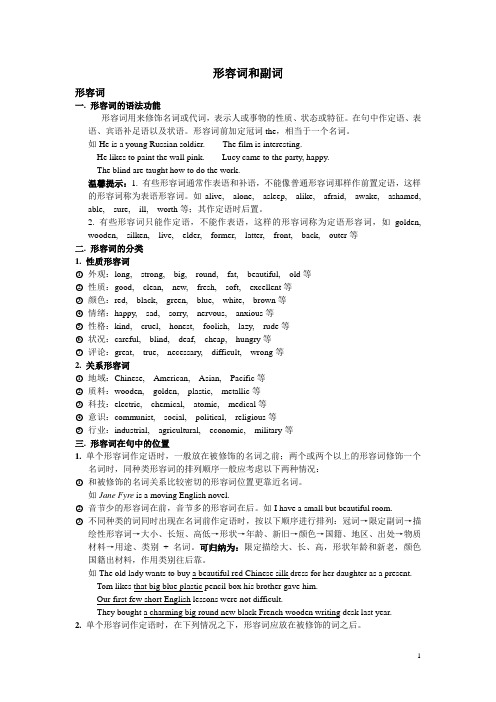
形容词和副词形容词一. 形容词的语法功能形容词用来修饰名词或代词,表示人或事物的性质、状态或特征。
在句中作定语、表语、宾语补足语以及状语。
形容词前加定冠词the,相当于一个名词。
如He is a young Russian soldier. The film is interesting.He likes to paint the wall pink. Lucy came to the party, happy.The blind are taught how to do the work.温馨提示:1. 有些形容词通常作表语和补语,不能像普通形容词那样作前置定语,这样的形容词称为表语形容词。
如alive, alone, asleep, alike, afraid, awake, ashamed, able, sure, ill, worth等;其作定语时后置。
2. 有些形容词只能作定语,不能作表语,这样的形容词称为定语形容词,如golden,wooden, silken, live, elder, former, latter, front, back, outer等二. 形容词的分类1. 性质形容词○1外观:long, strong, big, round, fat, beautiful, old等○2性质:good, clean, new, fresh, soft, excellent等○3颜色:red, black, green, blue, white, brown等○4情绪:happy, sad, sorry, nervous, anxious等○5性格:kind, cruel, honest, foolish, lazy, rude等○6状况:careful, blind, deaf, cheap, hungry等○7评论:great, true, necessary, difficult, wrong等2. 关系形容词○1地域:Chinese, American, Asian, Pacific等○2质料:wooden, golden, plastic, metallic等○3科技:electric, chemical, atomic, medical等○4意识:communist, social, political, religious等○5行业:industrial, agricultural, economic, military等三. 形容词在句中的位置1.单个形容词作定语时,一般放在被修饰的名词之前;两个或两个以上的形容词修饰一个名词时,同种类形容词的排列顺序一般应考虑以下两种情况:○1和被修饰的名词关系比较密切的形容词位置更靠近名词。
小学六年级英语上册《形容词副词》全面归纳,学习必备

六年级英语上册《形容词副词》全面归纳形容词、副词的区别形容词=名词+y / ly / ous / ive / fulEg:wind+y=windy;love+ly=lovely;danger+ous=dangerous;expense+ive=expensive;care+ful=careful副词=形容词+lyEg:careful+ly=carefully形容词、副词用法区别记忆口诀1、形名——形容词修饰名词Eg:a young girl2、动副——副词修饰动词Eg:run quickly3、系形——系动词后面跟形容词Eg:is lovely4、副形——副词修饰形容词Eg:very good形容词如何的排序?有一个房间,有很多的修饰限定词,如何给它们排序?按照如下顺序:美丑-大小-形状-新旧-颜色-国籍-材质-用途记忆口诀:美小圆旧黄,法国木书房A beautiful small round old yellow French wooden study room形副同形词有哪些?1、Well形容词性意思:身体好的副词性意思:好地2、Fast形容词性意思:快的副词性意思:快地3、Early形容词性意思:早的副词性意思:早早地4、Hard形容词性意思:难的,硬的副词性意思:勤奋地衍生词:Hardly 几乎不5、Late形容词性意思:晚的副词性意思:晚地衍生词:Lately 最近6、Near形容词性意思:近的副词性意思:近地衍生词:Nearly 几乎7、High形容词性意思:高的副词性意思:高地衍生词:Highly 高度地词的比较级和最高级变化规则。
小学英语语法形容词和副词详细讲解

形容词的用法
1)形容词在句子中通常放在名词前面,形 容词+名词,含有“······的”意思。如:
a clever boy 一个聪明的男孩 a blue car 一辆蓝色的汽车 注意:形容词在修饰someone, somebody,
something, anything, nothing等不定代词时, 需要置于其后。如: something important 重要的事情 nothing interesting没有什么有趣的事
2.I am very busy.(修饰形容词) 3.He runs too quickly .(修饰副词) 4.We play happily. (修饰动词)
⑤通常在形容词后加-ly变成副词。
slow → s_l_o_w__ly_ real → re_a_l_ly___
usual →u_s_u__a_ll_y careful→ca_r_e_f_u_l_ly easy →e_a_s_il_y__ happy→ha_p_p_i_ly__ heavy →h_e__a_v_il_y angry→an_g_r_i_ly__
星期日 星期一 星期二 星期三 星期四 星期五 星期六
always 100%
usually 75% often 50%
sometimes 25%
seldom 5%
never 0%
4)程度副词:表示程度的深浅
much 很,非常 very 非常
little很少
too 太
quite十分
5)疑问副词:用来引导一个特殊疑问 句。
用来修饰动词、形容词、其他副词,可表 示时间、地点、程度、状态等。如:
1The wind is blowing strongly.风刮的很大。 (副词strongly修饰动词blow,表示程度。)
完整版初中英语形容词及副词用法讲解
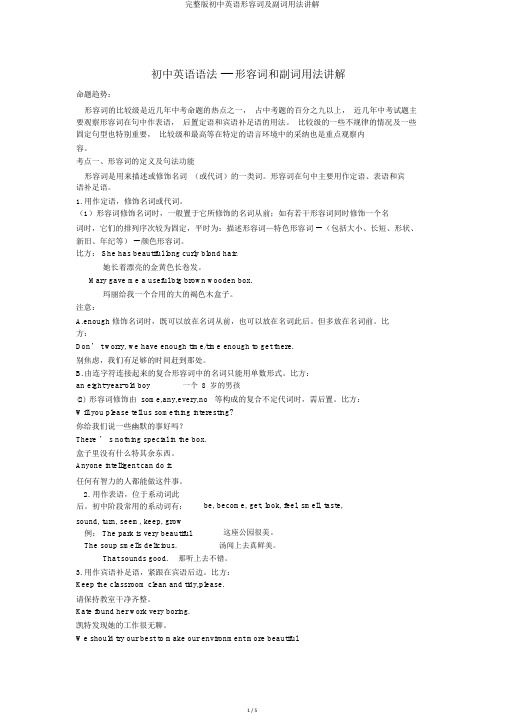
初中英语语法 --- 形容词和副词用法讲解命题趋势:形容词的比较级是近几年中考命题的热点之一,占中考题的百分之九以上,近几年中考试题主要观察形容词在句中作表语,后置定语和宾语补足语的用法。
比较级的一些不规律的情况及一些固定句型也特别重要,比较级和最高等在特定的语言环境中的采纳也是重点观察内容。
考点一、形容词的定义及句法功能形容词是用来描述或修饰名词(或代词)的一类词。
形容词在句中主要用作定语、表语和宾语补足语。
1.用作定语,修饰名词或代词。
(1)形容词修饰名词时,一般置于它所修饰的名词从前;如有若干形容词同时修饰一个名词时,它们的排列序次较为固定,平时为:描述形容词—特色形容词 -- (包括大小、长短、形状、新旧、年纪等) -- 颜色形容词。
比方: She has beautiful long curly blond hair.她长着漂亮的金黄色长卷发。
Mary gave me a useful big brown wooden box.玛丽给我一个合用的大的褐色木盒子。
注意:A.enough 修饰名词时,既可以放在名词从前,也可以放在名词此后。
但多放在名词前。
比方:Don’ t worry, we have enough time/time enough to get there.别焦虑,我们有足够的时间赶到那处。
B.由连字符连接起来的复合形容词中的名词只能用单数形式。
比方:an eight-year-old boy一个8岁的男孩(2)形容词修饰由 some,any,every,no 等构成的复合不定代词时,需后置。
比方:Will you please tell us something interesting?你给我们说一些幽默的事好吗?There ’ s nothing special in the box.盒子里没有什么特其余东西。
Anyone intelligent can do it.任何有智力的人都能做这件事。
形容词和副词英语语法讲解

• 1.She is my best firend ,so I know her very __
• A.good B .fine C.nice D.well
• 解析D本体考察的是形容词修饰名词。副词修饰动词的用 法本句意思是他是我的好朋友,因此我很了解他本句要修 饰是动词故用副词well
四、形容词和副词的比较等级
2. This building looks not so (as) high as that one.
3. This room is three times as large as that one.
比较级 1. 构成形式: - er more
注意不规则变化
more worse less
better farther further
原级
1. 肯定
2. 否定 3. 倍数源自as + adj. / adv. 原级 + as
not as (so) + adj. / adv. 原级 + as 倍数 + as + adj. / adv. 原级 + as
•
twice a larger than
倍数+ the size (height, length, width) + of 如:1. Mr. Sun speaks English as fluently as you.
• “…得多”:many, much, a lot, far, by far • “更,甚”:even, still
4. 比较级句型表达最高级含义 + any other + 单数名词
比较级 + the other + 复数名词 + any of the other + 复数名词
高考英语形容词和副词讲解
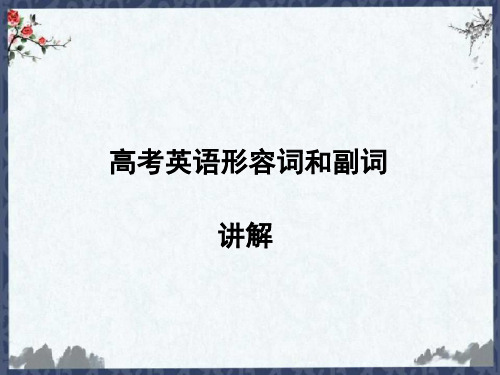
2.-ed形容词通常用于说明人的感受,常译为“感到……的”,强 调人自身的情感波动;修饰事物时,则多修饰air(神态),smile (微笑),feeling (感觉),appearance (容貌),cry (哭声),face (表情),voice (声音),mood (情绪),look (表情),eye (眼神)等 显示某人情感状况的名词。
在下列情况下,形容词要放在被修饰词的后面。 (1)形容词作定语修饰somebody,something,anyone,anything, nobody等复合代词时,需后置。 Is there anything wrong with your car? 你的汽车出什么毛病了吗?
(2)以-able或-ible结尾的形容词可置于由形容词的最高级或all, every,only等词修饰的名词后面。 This is the best computer available. 这是现在可用的最好的一台电脑。 (3)形容词短语作定语要后置。 That is a problem difficult to answer. 那是一个难以回答的问题。 (4)表语形容词(alive,asleep,awake,alike,available等)作定语, 一般要后置。 The girl awake is his younger sister. 那个醒着的女孩是他的妹妹。
填一填
3.present 目前的,现在的;出场的,出席的
目前的形势
在场的雇员
答案 the present situation;the employees present
4.concerned 担心的,焦虑的;有关的,有牵连的
忧心忡忡的医生
(与……事情)有关的医生
答案 the concerned doctor;the doctor concerned
高中英语语法知识:形容词和副词
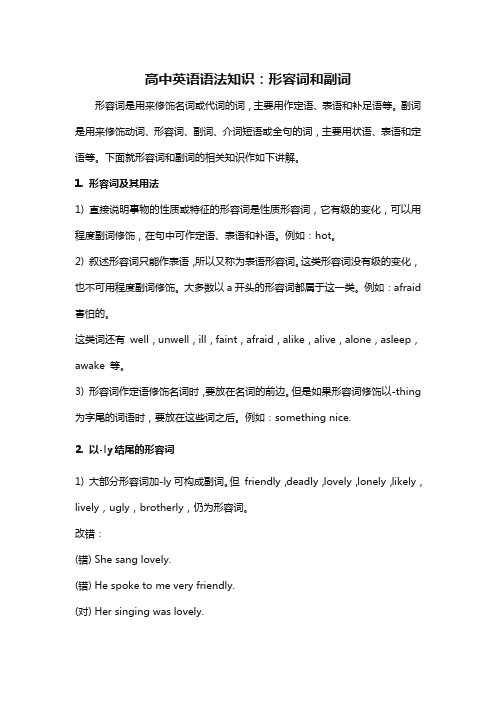
高中英语语法知识:形容词和副词形容词是用来修饰名词或代词的词,主要用作定语、表语和补足语等。
副词是用来修饰动词、形容词、副词、介词短语或全句的词,主要用状语、表语和定语等。
下面就形容词和副词的相关知识作如下讲解。
1. 形容词及其用法1) 直接说明事物的性质或特征的形容词是性质形容词,它有级的变化,可以用程度副词修饰,在句中可作定语、表语和补语。
例如:hot。
2) 叙述形容词只能作表语,所以又称为表语形容词。
这类形容词没有级的变化,也不可用程度副词修饰。
大多数以a开头的形容词都属于这一类。
例如:afraid 害怕的。
这类词还有well,unwell,ill,faint,afraid,alike,alive,alone,asleep,awake 等。
3) 形容词作定语修饰名词时,要放在名词的前边。
但是如果形容词修饰以-thing 为字尾的词语时,要放在这些词之后。
例如:something nice.2. 以-ly结尾的形容词1) 大部分形容词加-ly可构成副词。
但friendly,deadly,lovely,lonely,likely,lively,ugly,brotherly,仍为形容词。
改错:(错) She sang lovely.(错) He spoke to me very friendly.(对) Her singing was lovely.(对) He spoke to me in a very friendly way.2) 有些以-ly 结尾既为形容词,也为副词,如daily,weekly,monthly,yearly,early等。
例如:The Times is a weekly paper. 《时代周刊》为周刊。
The Times is published weekly. 《时代周刊》每周发行一期。
3. 用形容词表示类别和整体1) 某些形容词加上定冠词可以泛指一类人,与谓语动词的复数连接,如the dead,the living,the rich,the poor,the blind,the hungry等。
高中英语2025届高考语法复习形容词与副词知识讲解
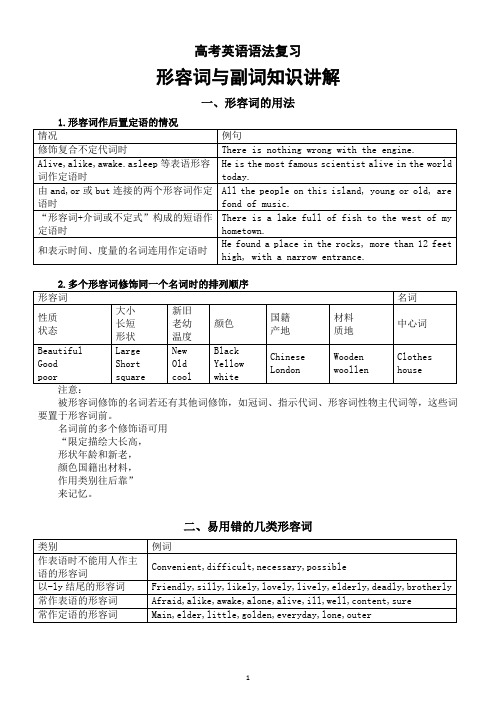
高考英语语法复习
形容词与副词知识讲解
一、形容词的用法
被形容词修饰的名词若还有其他词修饰,如冠词、指示代词、形容词性物主代词等,这些词要置于形容词前。
名词前的多个修饰语可用
“限定描绘大长高,
形状年龄和新老,
颜色国籍出材料,
作用类别往后靠”
来记忆。
二、易用错的几类形容词
三、形容词的比较等级
English is as interesting a subject as Chinese.
Which is the better of the two watches?
She is the taller of the two girls.
other或else把主语排除在比较对象之外;但如果不在同一范围比较则不需要用。
Susan is taller than any girl in her sister’s class.
四、副词的句法功能
五、副词的位置
六、副词比较等级的用法。
形容词副词讲解
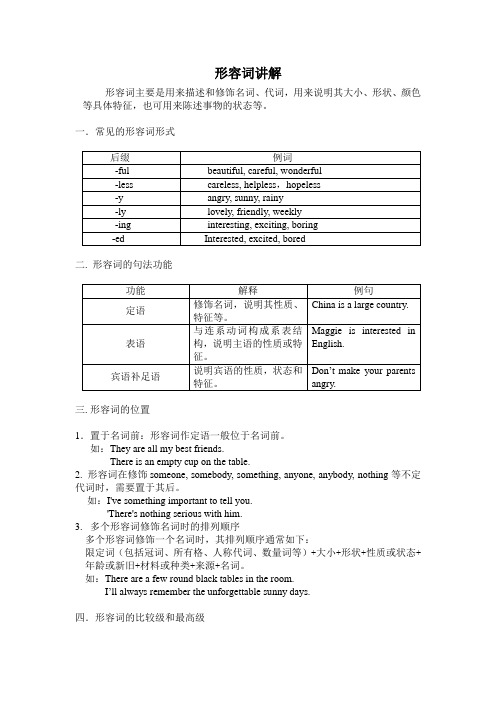
形容词讲解形容词主要是用来描述和修饰名词、代词,用来说明其大小、形状、颜色等具体特征,也可用来陈述事物的状态等。
一.常见的形容词形式二. 形容词的句法功能三.形容词的位置1.置于名词前:形容词作定语一般位于名词前。
如:They are all my best friends.There is an empty cup on the table.2. 形容词在修饰someone, somebody, something, anyone, anybody, nothing等不定代词时,需要置于其后。
如:I've something important to tell you.'There's nothing serious with him.3.多个形容词修饰名词时的排列顺序多个形容词修饰一个名词时,其排列顺序通常如下:限定词(包括冠词、所有格、人称代词、数量词等)+大小+形状+性质或状态+年龄或新旧+材料或种类+来源+名词。
如:There are a few round black tables in the room.I’ll always remember the unforgettable sunny days.四.形容词的比较级和最高级1.比较级和最高级的构成most interesting2.比较等级的用法1)两者程度相同的比较a.as+形容词原级+as如:My handwriting is as beautiful as yours.This book is as interesting as that one.b.not as/so as如:I am not as busy as you.Tom is not so bright as his brother.2)高于或低于另一方的比较比较级+than如:You look much younger than me.The weather in Beijing is drier than that in Nanjing.3)比较级+and+比较级这种结构表示事物本身程度的逐渐增长,意为“越来越……”如:Our country is becoming more and more beautiful.As summer is coming, the day is becoming hotter and hotter.4)the+比较级…,the+比较级…这种结构用来表示一方的程度随着另一方的程度的增长而增长,意为“越…越…”如:The more you eat, the fatter you will be.The shorter your talk is, the better it is.3. 最高级的用法. 表示在三者或三者以上中程度最高the+形容词最高级+名词+表示范围的短语或从句如:Jack is the tallest student in his class.He is the best runner in the team.4.比较级和最高级的修饰语1)修饰比较级的常用语和短语主要有much,even,a lot, a little等。
高中英语语法复习专题讲解形容词副词
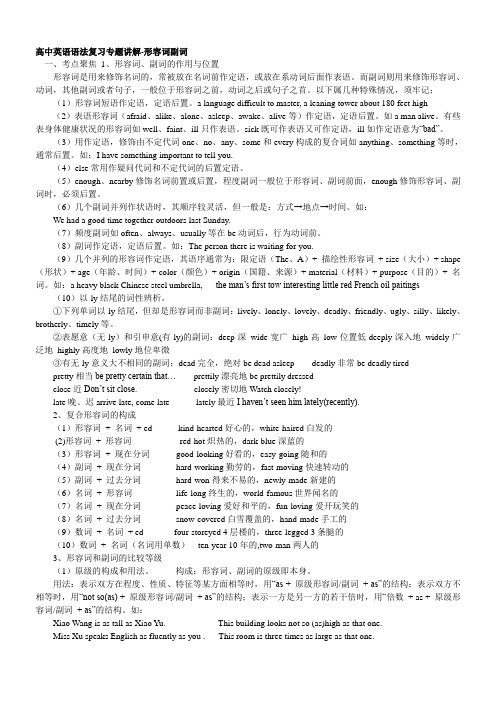
高中英语语法复习专题讲解-形容词副词一、考点聚焦1、形容词、副词的作用与位置形容词是用来修饰名词的,常被放在名词前作定语,或放在系动词后面作表语。
而副词则用来修饰形容词、动词,其他副词或者句子,一般位于形容词之前,动词之后或句子之首。
以下属几种特殊情况,须牢记;(1)形容词短语作定语,定语后置。
a language difficult to master, a leaning tower about 180 feet high(2)表语形容词(afraid、alike、alone、asleep、awake、alive等)作定语,定语后置。
如a man alive。
有些表身体健康状况的形容词如well、faint、ill只作表语。
sick既可作表语又可作定语,ill如作定语意为“bad”。
(3)用作定语,修饰由不定代词one、no、any、some和every构成的复合词如anything、something等时,通常后置。
如:I have something important to tell you.(4)else常用作疑问代词和不定代词的后置定语。
(5)enough、nearby修饰名词前置或后置,程度副词一般位于形容词、副词前面,enough修饰形容词、副词时,必须后置。
(6)几个副词并列作状语时,其顺序较灵活,但一般是:方式→地点→时间。
如:We had a good time together outdoors last Sunday.(7)频度副词如often、always、usually等在be动词后,行为动词前。
(8)副词作定语,定语后置。
如:The person there is waiting for you.(9)几个并列的形容词作定语,其语序通常为:限定语(The、A)+ 描绘性形容词+ size(大小)+ shape (形状)+ age(年龄、时间)+ color(颜色)+ origin(国籍、来源)+ material(材料)+ purpose(目的)+ 名词。
- 1、下载文档前请自行甄别文档内容的完整性,平台不提供额外的编辑、内容补充、找答案等附加服务。
- 2、"仅部分预览"的文档,不可在线预览部分如存在完整性等问题,可反馈申请退款(可完整预览的文档不适用该条件!)。
- 3、如文档侵犯您的权益,请联系客服反馈,我们会尽快为您处理(人工客服工作时间:9:00-18:30)。
形容词、副词讲解
一、易混形容词
1. too many, too much 与much too
2. few, a few, little与a little
如:There are a few differences between the two. 这二者之间有一些差异。
There is a little wine left in the bottle. 瓶子里还剩一点酒。
He has few friends because he is a selfish person. 他几乎没有朋友因为他太自私了。
There is little wine left in the bottle. 瓶子里几乎没酒了。
3. interested与interesting
如:I have something interesting to tell you. 我要告诉你一些有趣的事。
I am very interested in this position. 我对这个职位很感兴趣。
She shows great interest in American history. 她对美国历史很感兴趣。
◆It’s +形容词+for sb.+to do sth.句型中的形容词要用v.-ing的形容词。
拓展:
同类考点的词还有:bored/ boring; relaxed/ relaxing; excited/ exciting; surprised/surpring; amazed/amazing。
4. alive, lively, living与live
alive, lively, living与live均与词根live有关。
其具体用法区别如下。
如:The badly wounded soldier was still alive when taken to the hospital.
当受伤的士兵送到医院时,他还活着。
Everything is lively here. 这儿一切都生机勃勃。
English is a living language. 英语是一门活的语言。
He said he had seen a live whale. 他说他看见过活鲸鱼。
Do you like a live show or a recorded show? 你是喜欢直播还是录音。
形容词的特殊句型
It’s+ adj. + of/f or sb.+ 不定式句型
“It’s+ adj. +of sb.+ 不定式” 表示“某人(做某事)怎么样”。
of sb.句型中的形容词一般为表示性格、品德、主观感情或态度的形容词,常用的有:good, kind, nice,polite, clever, lazy, careful, careless, right, wrong 等。
“It’s+ adj. + for sb.+ 不定式” 表示“做某事对某人来说怎么样”。
for sb.句型中的形容词一般为表示事物的特征,表示客观形式的形容词,常用的有:difficult, easy, hard, dangerous, safe, useful,
pleasant, interesting, impossible 等。
二、副词词义辨析
(1)副词的位置及分类
(2)副词的构成
注意:1. 有些以 ly 结尾的词是形容词而非副词。
如:motherly(慈母般的), lovely(可爱的), lively(活泼的,有生机的), friendly(有好的), lonely(孤独的)。
2. 有些副词有两种形式,其中一种形式与形容词相同,另一种形式是在形容词后加 -ly,意义有区别。
常见的有:。
